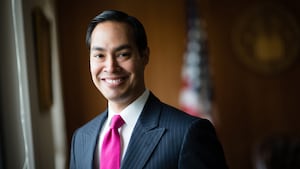SAN DIEGO, California—What’s the definition of “open borders”?
It’s just a buzz phrase to rile up people who want to get rid of illegal immigrants, cut back on legal immigrants, and make America white again. It’s the new weapon of choice, replacing the tired-out zinger of the 1990s: “amnesty.”
Take the reader who recently called me a “hate-all-who-are-not-Hispanic-or-Latino racist like other Trump haters who writes for open borders brainwashing rags like the Washington Post.”
Or look at President Trump himself, who says “Democrats want Open Borders, which equals violent crime, drugs and human trafficking…”
Here’s how I define “open borders.” For me, “open” means open. There would be no guards, no fencing, and no impediments of any kind. Anyone who wants to cross the international boundary—for any reason, and with whatever intent—could do so. It would be like it was before May 28, 1924, the date that the U.S. Border Patrol was formed: Come one, come all.
That would be insanity. And that’s why no one is calling for it.
Even the most radical Democrats—and I hear often from many of them—will concede that the United States has the right to preserve its sovereignty and protect its borders. They may have strong ideas about the best way to do that, but no one wants to just fling open the doors and let in the whole world.
And yet, criticize the Trump administration for bungling the humanitarian crisis on the U.S.-Mexico border, and its supporters will tag you for supposedly favoring “open borders.”
Oddly enough, some liberals seem to have have bought into this narrative that being more welcoming and more humane to immigrants and refugees is somehow the same as calling for “open borders.” Recently, ABC News’ George Stephanopoulos interviewed Julian Castro. The host asked the 2020 Democratic presidential hopeful if pushing to change illegal entry from a crime to a civil violation didn’t amount to “open borders?” There is that phrase again.
As you can see, the left continues to wrestle with the immigration issue. Note that some of the most aggressive federal crackdowns on illegal immigration in the last 30 years have occurred while Democrats occupied the White House.
Former Homeland Security Secretary Jeh Johnson, a self-described Democrat, recently wrote an op-ed warning his party that decriminalizing unauthorized border crossings would be “tantamount to a public declaration (repeated and amplified by smugglers in Central America) that our borders are effectively open to all.”
That’s a scare phrase but one that resonates with many of the Democrats who, in the 1990s, were terrified of being seen as soft on crime. Today, they are terrified of being seen as soft on illegal immigration.
That’s why so many have been silent or downright squeamish on Castro’s call for “decriminalizing” illegal entry into the United States as a way of ending the current crisis. Castro’s thinking, as he explained a couple of weeks ago in the first Democratic debate, goes like this: Since the administration is treating women and children seeking asylum as criminals, why not change the law that makes crossing the border without authorization a crime?
And that’s what immigration restrictionists call “open borders.” But declaring that something isn’t a criminal offense isn’t the same thing as saying there should be no consequence for doing it. What Castro and others who agree with his point of view say they want is to make unauthorized entry what it has long been treated as: a civil infraction, punishable not by jail time but by what is often a swift deportation—or voluntary removal.
In any case, the rest of the U.S. government’s border enforcement apparatus would still be in place. Currently, the Department of Homeland Security spends more than $28 billion per year on border enforcement. And you can’t very well have an “open” border if you deploy thousands of border patrol agents, nearly 700 miles of security fencing, guns, vehicles, drones, electronic sensors.
Which leads us to this question: What causes illegal immigration—or, because these two things need to be treated separately given the different reasons that people come to the United States, the current asylum crisis of would-be refugees clamoring at the U.S.-Mexican border?
For many Americans, the answer is perceived lax border enforcement. The thinking goes: If word gets out throughout Latin America that the United States has an “open border,” we’ll have a flood of people heading north to take advantage of it.
But there are a dozen other factors—beyond border enforcement—that push people out of their own countries, and pull them to this one.
For instance, there’s the push that comes from fear and the fact that—in Honduras, Guatemala, and El Salvador—desperate mothers take ruthless street gangs at their word when they threaten to recruit their sons and rape their daughters, and head to the United States for safe haven.
Then there’s the pull of family members who are already in the United States and who form a social safety net reminiscent of the one created 150 years by the Irish immigrants who settled in Boston or German immigrants who found their way to Chicago.
The border crisis—and the loaded charge of supporting “open borders”—creates a political predicament for Democrats. It splits the party between those who want to find a solution to the problem, and those who simply want to avoid any course of action that might jeopardize their political future by making them appear weak on border security.
Castro appears to be in the first camp. He’s calling for the repeal of Section 1325 of Title 8 of the U.S. Code, which was adopted in 1929 and for the first time made it a crime to enter the United States unless one did so at a designated port of entry. That law was updated by the 1996 Illegal Immigration Reform and Immigrant Responsibility Act (IIRIRA), which was signed into law by the same immigration hardliner who, in 1994, also militarized the U.S.-Mexico border south of San Diego through Operation Gatekeeper: President Bill Clinton.
But the law had a glitch, in that it also provided for civil penalties. And, for the last several decades, federal agents and prosecutors have considered it more practical and efficient to focus on that language and treat violations as civil offenses. Otherwise, given the number of border-crossers in any given year, they could have filled up the nation’s federal detention facilities in a month.
Castro wants to go back to treating what the U.S. government calls “improper entry” as a civil violation. And he is not alone. Recently, nearly 250 civil rights groups and immigrant advocacy organizations demanded the same thing in an open letter to Democratic House Speaker Nancy Pelosi and Republican House Minority Leader Kevin McCarthy. Thursday, Elizabeth Warren produced her own plan for moving away from 1325.
But what Castro and other reformers don’t understand, or perhaps do understand but refuse to accept, is that many if not most Democrats want nothing to do with what they’re proposing. They include former Rep. Robert Francis “Beto” O’Rourke, who considers repeal of Section 1325 a bridge too far. What’s unclear is whether O’Rourke, and those who agree with him, got to this position because they really believe it’s important to draw a line at the border or because they fear a backlash if they say otherwise.
I see where O’Rourke is coming from. I do. For me, as the son of a retired cop, I generally think that crimes should remain crimes. It’s one reason why I still use the phrase “illegal immigrant.” But, in this case, given that we have long treated illegal entry as a civil violation rather than a crime, I tend to side with Castro. And I appreciate the value of this debate in forcing Democrats as a whole to walk it like they talk it. It’s not enough to constantly remind us that you’re not as racist and repressive as Republicans. That’s fine Now what are you going to do?
The saddest part of the immigration debate is the politics. Republicans are scared of immigrants and refugees. Democrats are scared to show that they care what happens to them.







